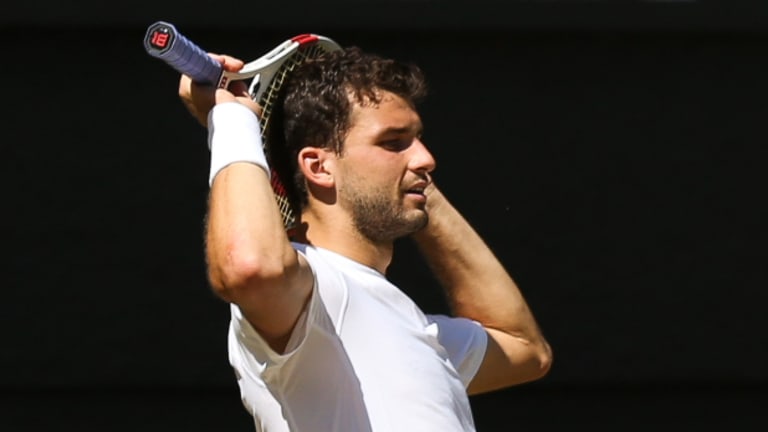WIMBLEDON, ENGLAND—This year’s Wimbledon has been cast as a battle of the generations. A long-delayed future, we’re told, is trying to push its way onto the stage, while a glorious present is clinging desperately to its last moments in the spotlight. So far here, youth has taken a longer turn on that stage than we’re used to seeing. Twenty-year-old Eugenie Bouchard is in the women’s final, while Serena Williams and Maria Sharapova are long gone. Nick Kyrgios, 19, knocked off Rafael Nadal, 28. Milos Raonic, 23, reached his first Grand Slam semifinal.
On the surface, there was no better demonstration of that clash than the first semifinal here on Friday, between Novak Djokovic and Grigor Dimitrov. The top-seeded Djokovic was playing his 22nd Grand Slam semi; Dimitrov was playing his first. This was the quintessential match between youth and age, except for one small problem: Djokovic is 27 and Dimitrov is 23. The fact that they could be separated in years by so little, and in big-match experience by so much, is one more sign of how thorough the Big 4’s dominance has been. It has taken so long for the next ATP generation to make its mark, they’ve threatened to turn into grizzled veterans first.
Yet if Novak vs. Grigor—can we call their matches Grinole?—wasn’t a contest between young and old, there was at least a sense of the familiar facing off against the unfamiliar. It wasn’t especially well-played, but there was an unpredictable, daredevil quality to it, and it was tensely competitive and psychologically testing throughout. Both men spent nearly as much time sprawled on the grass as they did upright. Dimitrov, who at one point fell down and then fell again before he could get up, changed his shoes four times; Djokovic switched once. More than the shoes, though, I’d say the culprit was the dauntless way these two slide across the court. It’s tough to stop on the dust that passes for a playing surface at the baseline.
Dimitrov brought the same, fresh all-court attack he had against another well-traveled 27-year-old, Andy Murray, in the quarterfinals. Slashing, leaping, sliding, slipping, and crashing to the court, at his best he played with an abandon that can only be described as youthful. He opened up rallies with his forehand, fired 15 aces, hit 48 winners, and was 38 of 48 at the net. He also started erratically, double-faulted eight times—including three in one game—let an agitated Djokovic off the hook in the third set, nd squandered three set points in the fourth. It wasn’t a match that Dimitrov should have won, exactly, but it was one he could have won.
“Of course I’m frustrated,” said the Bulgarian, who moves into the Top 10 for the first time with this result. In Australia, he cried after losing a similarly tight quarterfinal match to Rafael Nadal, but this time he was dry-eyed and even-keeled.
“I came out on the court to win,” Dimitrov said. “I think I had a pretty slow start, but at some point I got my act together and I was really playing good tennis. You never know what would have happened if I had taken the fourth set.”
